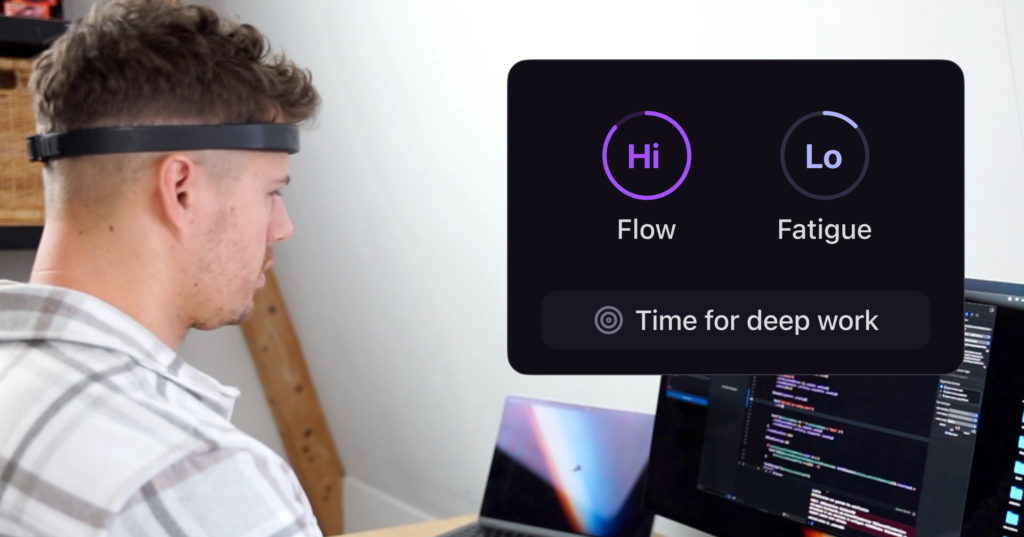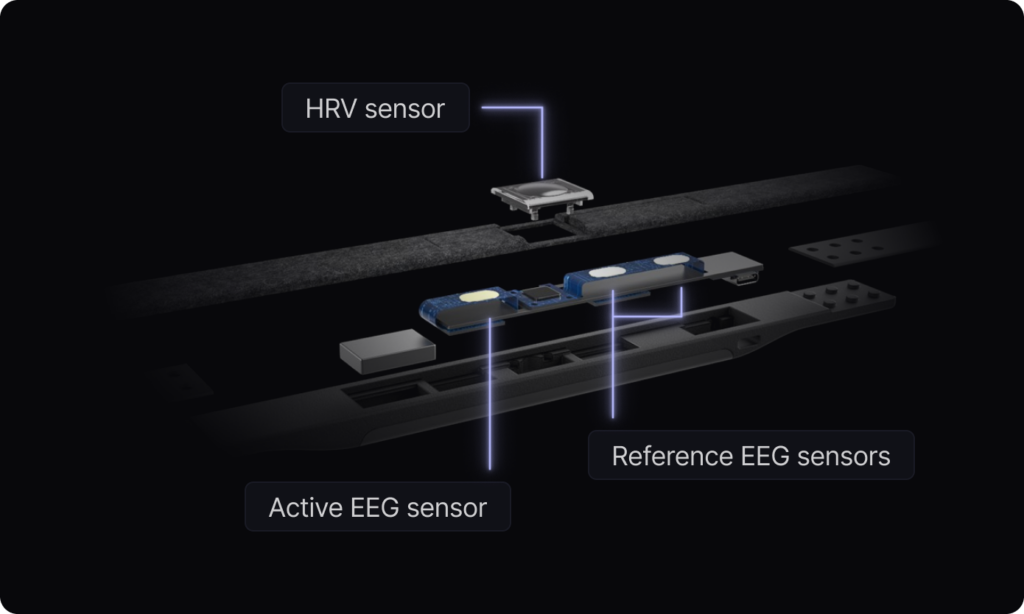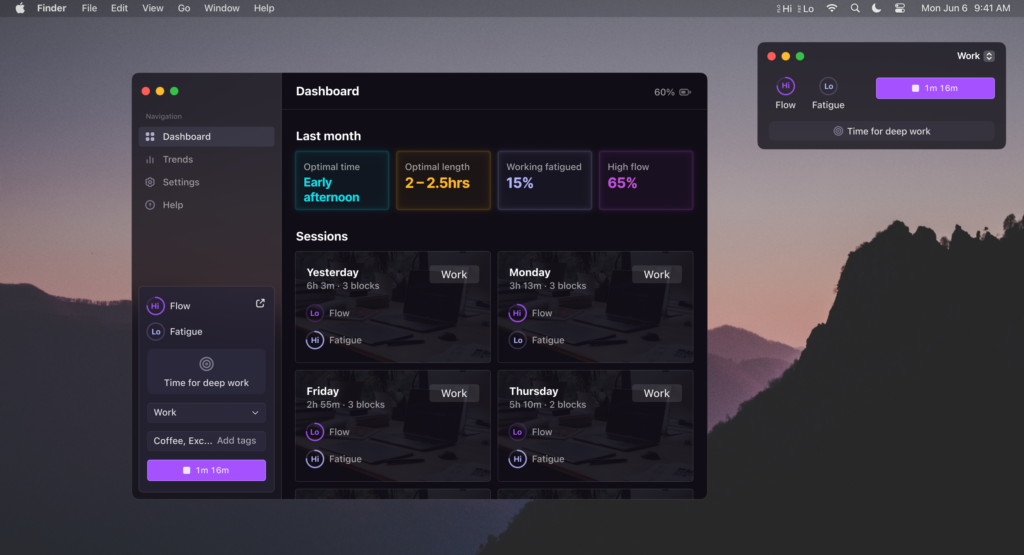Welcome to this edition of our Tools for Thought series, where we interview founders on a mission to help us think better and work smarter. Ben Wisbey is the founder of Pylot, an innovative wearable to track your mental energy and help improve your productivity. This is his second time participating in the series, and he has exciting updates.
In this interview, we talked about the definition of mental energy and how it impacts our performance, accounting for fluctuating energy throughout the day, the results of their beta trials, and much more. Enjoy the read!

Hi Ben, it’s great to have you back! You just completed the Pylot beta trials and are launching the first public version. First, how are you feeling?
Thanks for having me back. We are so excited to finally be getting Pylot out into the world and will be shipping in May. As a reminder, Pylot is the first wearable to track mental energy, to help you optimize your productivity. We have been conducting beta trials for the last few months and have learnt a lot.
The most exciting thing is that all users felt that Pylot could assist them manage their day better and improve their productivity. Pylot started five-years ago as a scientific project to see if we could measure cognitive performance, and how that related to work productivity. As with most projects, it has taken a lot longer than expected, but it is great to be preparing to ship.
You believe that energy management, not time management, is the key to success. Can you tell us more?
We get caught up on managing our time, as it is easy to plan this on our calendar. But not all hours are created equally. An hour of dedicated deep work is worth its weight in gold. I am sure we have all had the feeling of ‘achieving more in the last hour than I did for the rest of the day’.
Interestingly, research has shown that knowledge workers were five-times more productive when they were in flow. The average knowledge worker is productive for approximately 2.5 hours a day, yet they spend 8 hours achieving this. If our cognitive state can make that large of an impact on our productivity, then that is a good indication that managing our mental energy is more important than managing our time.
This is what drove us to create Pylot originally – one of the founders wasn’t working at his best when scheduling important tasks in his calendar. So he started monitoring himself in an attempt to understand why. We believe that by managing your energy, you can work less, but produce more higher quality work.
And you have specifically decided to focus on mental energy.
For us, mental energy is the key to productivity. Two years of research taught us this had a much greater impact than we had expected. When we say mental energy, it is important to understand what it is. We use this term as it is easy to understand and we don’t want to get bogged down in scientific detail. However, Pylot actually uses electroencephalography (EEG) and heart rate variability (HRV) to measure flow and mental fatigue.
EEG measures brain wave activity; specifically, alpha brain wave activity is the basis for the measurement of flow. Flow is the state of relaxed concentration where you are completely absorbed by your work, and you perform at your best when flow levels are high. When EEG data is then combined with HRV, mental fatigue can then be measured. Sustained levels of cognitive load result in increased mental fatigue, which in term makes it more difficult to achieve high flow.

And how does mental energy impact our performance?
This is the key question. There is no point in measuring mental energy if it has no relationship to your performance. We spent two years conducting this research and honestly didn’t know what we would find. We only decided to make a product after we were confident that the measurements were closely related to task performance.
If you read about flow, it will often reference the impact it has on creativity and decision making. From a work point of view, it is very difficult to objectively measure ‘creativity’ or ‘productivity’. To overcome this, we initially focused our research on controlled mentally challenging tasks. We then validated the findings on competitive computer game players as their performance was easy to measure. Games have a clear outcome and lots of data associated with performance.
Across all this research, we were surprised by the impact that cognitive performance had on task outcome. We found that the win rate of a competitive gamer was significantly higher when they spent more time in flow, and they started the game with low fatigue. Additionally, there were interesting findings such as better players spent more time in high flow than their lower ranked colleagues.
Personally, the results of our trials took me from thinking mental energy was important, to making me realize it was the key to achieving my goals. Numerous studies affirm our findings that achieving a flow state correlates with higher performance levels, improved work efficiency, and enhanced cognitive function, including better exam results. Research has also shown that flow contributes to greater team productivity and individual job satisfaction.
Our energy levels fluctuate a lot throughout the day. How does Pylot account for this?
If you read most productivity books, they will talk about tracking your mental energy throughout the day by marking down how you feel each hour. But, humans are really poor at subjectively assessing this. So we wanted to be able to objectively measure mental energy allowing us to make better decisions about our work habits.
Not only did this need to be based on science but it needed to be practical for daily use, and cheap enough to buy for the average worker. Therefore we settled on the use of EEG and HRV. While each is valuable in their own right, combining these sensors is what allows Pylot to maximize the insights it provides on mental energy. The ease of use of having live and historic data without having to think about it is extremely valuable.
Can you explain how someone could leverage that information?
Pylot has been developed to be user-friendly. In short, you can just wear Pylot as often as you want while working or studying, and it will learn your personal profile. Once it has enough data, it will then provide feedback on your optimal time of day and optimal length of your work blocks.
However, as every day is not the same, it also provides live feedback, including a recommendation on what you are ready for right now: deep work, shallow tasks, or a break. So it is a very easy product to use and benefit from.
If you love getting into the details of your productivity habits, then you can take this one step further. You can tag your recorded work sessions to learn the impact that different routines have on your performance. For example, tag a few work blocks with ‘music’ and you can see the impact that listening to music has on your mental energy.
We are also aware that some people love data; if you are one of these people then Pylot allows you to access all raw data locally and get into the details.
Can you share some of the key learnings from the Pylot beta trials?
Firstly, the beta users were awesome. The feedback, patience and consistency of use has been amazing.The reason a product is in beta is because it isn’t perfect. And when you have a wearable that combines hardware and software, there are plenty of challenges.
One of my highlights was from one of our beta users who struggled with mental fatigue that limited his ability to work full days. His feedback after using Pylot for a while was “Pylot is helping me identify patterns during my day so I know when to do my best work, and when to take a break.” It was having a real impact on how he managed his day.
From a product point of view, we always look for what needs to be improved to make the product right. Feedback led to a number of quick app improvements, but hardware is a little more difficult as production cycles take months. Our own internal testing identified the headband needed to be more comfortable, and the beta users agreed with this once they started testing.
This has been our focus as we prepare to ship. We have made a number of significant improvements to the band which means it is now comfortable for all day use. You forget you are wearing it. Despite the imperfections, we felt we were heading in the right direction with Pylot when users reported back that Pylot was helping manage their mental energy.
Has the way you use Pylot evolved over time?
I have been using Pylot for about a year at this point, and my usage has gone through various phases. Throughout all this period, the one thing I continue to love is the ease of use. I just put on Pylot and it starts recording on my computer. Then one click to stop it and see results. In regards to how my personal use of Pylot has evolved, I have been through three phases.
Initially, I found it super useful to see how my mental energy varied throughout the day. I always knew I was a morning person, but to see my flow gradually increase throughout the morning, then fall off in the afternoon allowed me to schedule my key tasks in that late morning window, and save emails and admin tasks for the afternoon.
I then found that my optimal deep work times were correct most days, but not every day was the same. So I started finding the live feedback very valuable. From this I learnt that I needed to have regular breaks so I could work intensely, recover, then repeat.
After a year of use, I now find myself craving the information after each deep work block. Did I spend enough time in high flow? What is my fatigue like? Was that a successful work block? And what action should I take to ensure I start the next work block with high mental energy.
You’ve made so much progress already… What’s next?
We are very bullish on the concept of monitoring mental energy as we strongly believe it can help people achieve better outcomes in less time. Priority number one for us, is shipping Pylot in May and delivering on our core offering of identifying ideal time of day for deep work, and providing a recommendation on when a break is needed.
But we have a long list of features we want to introduce over the coming year. One of the highlights of these is integrating with health and fitness data, so we can answer practical questions such as ‘how many hours of sleep is needed to optimize my mental energy?’ or does exercise in the morning give me a mental boost?’. Understanding this information can help us manage life for optimal performance.
We also want our apps to provide more predictive suggestions. At the moment, Pylot provides live feedback and recommendations, but we want it to learn individual patterns. For example, it might see a certain response and know that this type of response generally leads to low levels of mental energy in the morning, leading to a recommendation to structure your day around afternoon peak times.
Thank you so much for your time, Ben! Where can people learn more about Pylot?
Pylot launches in May and we are currently taking pre-orders on our website. We have an increasing price scale, meaning that Pylot is discounted now and the price will gradually increase as shipping approaches. We want to reward those that get onboard early. Thanks!

